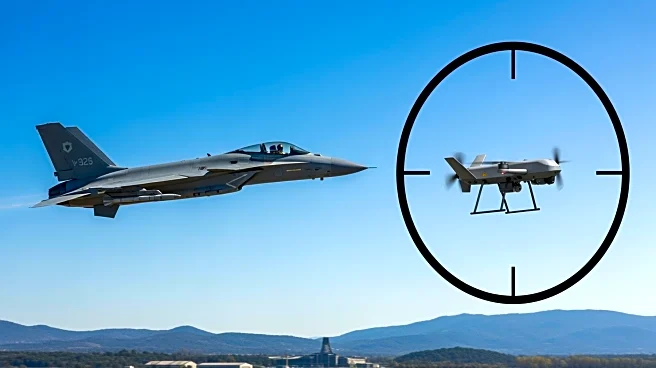What's Happening?
The German Luftwaffe has dispatched drone-defense experts to Belgium following a series of drone sightings near critical military facilities, including those housing U.S. nuclear weapons. The deployment
comes after Belgium requested assistance due to a significant increase in unidentified drone activity, which has disrupted air travel and raised security concerns. German Defense Minister Boris Pistorius emphasized the urgency and capability of Germany to address the issue, highlighting the close cooperation within NATO. The mission is described as being of limited duration, focusing on detecting and defending against small unmanned aerial vehicles.
Why It's Important?
The deployment of German drone-defense experts to Belgium underscores the growing concern over drone incursions near sensitive military sites. Such incidents pose security risks and highlight the need for effective counter-drone measures. The situation emphasizes the importance of international cooperation in addressing hybrid threats, with NATO allies working together to ensure regional security. The presence of U.S. nuclear weapons at affected sites adds a layer of complexity, necessitating swift and coordinated responses to prevent potential breaches. The incident may prompt further investments in drone defense technologies and strategies across Europe.
What's Next?
Belgium and Germany may continue to collaborate on enhancing drone defense capabilities, potentially leading to joint exercises and technology sharing. The situation could prompt NATO to review and strengthen its policies on drone threats, ensuring member states are equipped to handle similar incidents. As investigations into the drone sightings continue, there may be increased scrutiny on potential state actors involved, influencing diplomatic relations and security policies. The deployment may also lead to discussions on expanding drone defense initiatives within the European Union, fostering greater regional security cooperation.
Beyond the Headlines
The drone sightings near military sites raise ethical and legal questions about the use of unmanned aerial vehicles in sensitive areas. The incident highlights the challenges in regulating drone activity and ensuring compliance with international security standards. It also underscores the evolving nature of warfare and the need for adaptive defense strategies to counter emerging threats. The situation may influence public perception of drone technology, prompting debates on privacy, security, and the balance between innovation and regulation. Additionally, the incident serves as a reminder of the interconnectedness of global security dynamics and the importance of maintaining vigilance against hybrid threats.










